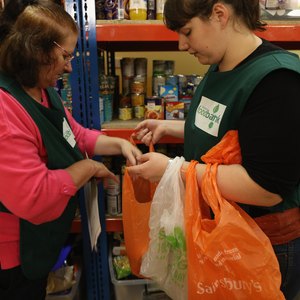
Homeless shelters take donations in forms beyond cash. Because shelters serve the homeless population each day, they try to address various needs, including personal care and dietary. Each shelter has its own policies on what types of donations it will accept, so before you donate any items, check with the shelter.
Food
Food donations to homeless shelters come with rules, which vary by location. Many shelters only take nonperishable food items with clear expiration dates, such as canned vegetables with dates printed somewhere on the can. You'll need to contact local shelters to determine which types of food donations they accept. Local food and safety laws often prevent shelters from taking perishable foods and donations of day-old items from local food businesses.
Personal Care Items
Homeless shelters often request personal care items so they can distribute the items to people living in the shelter. These items include toothbrushes, toothpaste, plastic bandages, dental floss, deodorant, feminine hygiene products, nail clippers, baby wipes and even some over-the-counter medicines, such as cortisone creams. The shelter will have a list of personal care items it accepts available for people who want to donate. Items should be in their original packaging, with any safety fixtures, such as a tab over the top of a new deodorant stick, still in place.
Clothing and Linens
People often donate old clothing and bed linens to other large charity organizations, but homeless shelters need clothing to distribute to people they help. Shirts, pants, jackets, sweaters, scarves and gloves in all styles and sizes are usually accepted at a homeless shelter. Donating business clothing, such as suits, is encouraged, as the people at the shelter can use the clothes for job interviews. Donated clothing or bedding may be worn but should be in good condition. Some shelters accept more personal items, such as socks and underwear, if the items are still in their original packaging.
Toys and Games
Homeless children in shelters often have few personal possessions, including toys and board games. Some shelters that accept families take donated toys and games so the children have something to play with while they're staying in the shelter. An adult-only shelter might accept donated board games, as adults play these games as well. Contact the shelter before preparing your donation so you know what they'll accept.
Time
If you don't have any items to donate or want to do more, you can volunteer at the homeless shelter in your area. Positions vary by shelter, but your local shelter might need people to coordinate drives or help prepare meals and hand out items. If you have a skill, such as drawing, you can donate your time by providing free instruction or activities in your skilled area at the shelter.
References
Writer Bio
Anna Assad began writing professionally in 1999 and has published several legal articles for various websites. She has an extensive real estate and criminal legal background. She also tutored in English for nearly eight years, attended Buffalo State College for paralegal studies and accounting, and minored in English literature, receiving a Bachelor of Arts.

